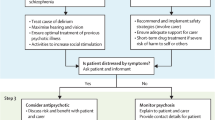Abstract
Objective: The aim of the present study was to compare the efficacy and safety of tiapride versus haloperidol and placebo in the treatment of agitation and aggressiveness in elderly patients with mild or moderate mental impairment. Method: This international, multicentre, randomized, double blind, three parallel groups study compared efficacy and safety of a 21-day regimen of tiapride 100–300 mg/day versus haloperidol 2– 6 mg/day and placebo in 306 elderly patients with mild or moderate dementia according to DSM III R and behavioural troubles with the Multidimensional Observation Scale for the Elderly Subjects (MOSES) irritability/aggressiveness subscore ranging from 16 to 30. Results: The percentage of responders (defined as patients with at least a 25% MOSES irritability/aggressiveness subscore decrease between the inclusion and the end of the treatment) was significantly greater in the tiapride (63%, P=0.04) and haloperidol (69%, P=0.004) groups than in the placebo group (49%), with no significant difference between the active drugs. Similar results were observed for the mean MOSES irritability/aggressiveness subscores on D7, D21 and at Dend which were significantly smaller in the tiapride and haloperidol groups than in the placebo group. The decrease between D0 and Dend was significantly greater in the tiapride (6.57, P=0.009) and haloperidol groups (6.75, P=0.005) than in the placebo group (4.71). The global improvement CGI was significantly better in the tiapride and haloperidol groups than in the placebo group (P=0.03 and P=0.02). No significant difference was observed between the two active drugs or among the three treatment groups for the Folstein’s Mini Mental Status scale (MMS) total score, and there was no notable change during treatment. The number of patients with adverse events, assessed on the Udvalg Kliniske Undersogelser scale (UKU), and the number of UKU symptoms were smaller in the tiapride group (62 patients, 61%, 212 events) than in the haloperidol group (77 patients, 76%, 305 events) and identical to that observed in the placebo group (69 patients, 67%, 234 events). Of interest, the number of patients with at least one extrapyramidal symptom was significantly lower (P=0.003) in the tiapride group (16 patients, 16%) than in the haloperidol group (34 patients, 34%) and similar to that of the placebo group (18 patients, 17%); the difference observed between the haloperidol and placebo groups was significant (P=0.008). Conclusion: Tiapride is not different from haloperidol in the treatment of agitation and aggressiveness in elderly patients and better tolerated, in particular with significantly fewer extrapyramidal symptoms.
Similar content being viewed by others
Author information
Authors and Affiliations
Additional information
Received: 17 February 1999 / Final version: 1 October 1999
Rights and permissions
About this article
Cite this article
Allain, H., Dautzenberg, P., Maurer, K. et al. Double blind study of tiapride versus haloperidol and placebo in agitation and aggressiveness in elderly patients with cognitive impairment. Psychopharmacology 148, 361–366 (2000). https://doi.org/10.1007/s002130050064
Issue Date:
DOI: https://doi.org/10.1007/s002130050064




